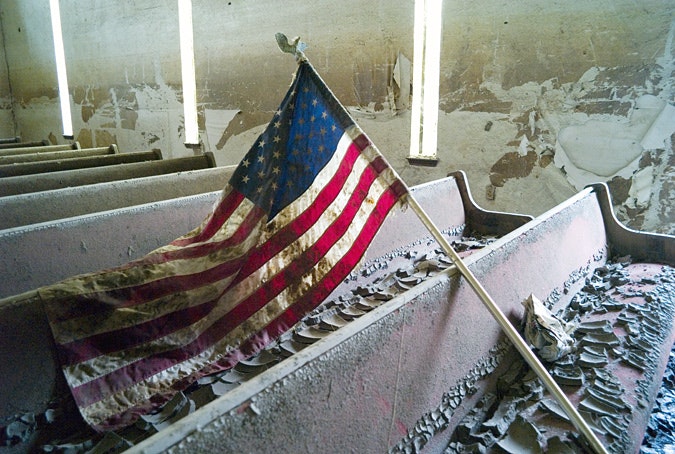Remembrance: Five Years On
By Thomas Hilbink & Yukiko Yamagata

Today we remember the people whose lives were lost or inalterably changed when the levees failed in New Orleans five years ago. We also thank those who have dedicated their lives to rebuilding the city and its communities.
Photographer Stanley Greene remembers:
I was just in New Orleans and had a moment to return to the Lower Ninth where I photographed the destroyed flag in the Battle Ground Baptist Church. The church was originally located in Fazendeville, a small African-American community that thrived in St. Bernard Parish from 1867 to 1964. Fazendeville occupied the site of the Battle of New Orleans in the War of 1812. Among its many functions, Battle Ground Baptist Church served as performance space and community hall. When the neighborhood was razed in 1964, the church’s pastor, Reverend Allen Thomas, relocated Battle Ground Baptist Church to Flood Street in the Lower Ninth Ward. Much of the congregation followed, making the church the center of the displaced Fazendeville community.
The Battle Ground Baptist Church was destroyed by Hurricane Katrina and left abandoned for many years afterwards. The image of the destroyed flag was taken in the summer of 2007 and since then, the church remains have been razed to the ground, and the residents of the neighborhood were all scattered by Hurricane Katrina and the floods that followed.
When I took this picture of the American flag inside the church, it was the only thing left standing, like a flag one would find on a field of battle. This takes on special significance when considering that the church had stood on the site of the Battle of New Orleans. When looking at the photograph, it almost says “defeated for now but not broken,” which is what you can say about the people of the Lower Ninth.
* * *
In the five years since Hurricane Katrina hit New Orleans and the levees broke, residents have developed innovative approaches to tackling some of the city’s—and the nation’s—most persistent problems: criminal justice reform, unresponsive government, and racial and economic inequality. In recognition of these efforts, during the month of August the Open Society Blog shines a light on people and organizations in New Orleans bringing change from within one of the country’s most important cities.

Until June 2022, Tom Hilbink was the director of the Grant Making Support Group.

Until December 2021, Yukiko Yamagata was curatorial and deputy director of Culture and Art at the Open Society Foundations.